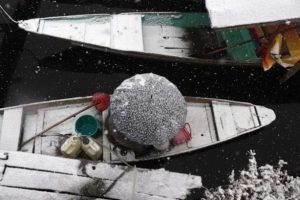Amid cloud cover and snowfall at a few places in south Kashmir, the night temperatures rose considerably across Kashmir Valley, unnamed officials said on Monday.
A Meteorological Department (MeT) official told a local news agency, Global News Service (GNS) that that mercury settled in Srinagar at 0.6°C against minus 5.2 °C on the previous night. The latest minimum temperature is almost more than a degree Celsius above the normal for this time of the year in Srinagar where people endured the second coldest night at minus 6.6 °C in a decade on 19 December.

The temperature also remained above or equal to normal level in other parts of the Valley with Gulmarg, the world-famous skiing resort recording a low of minus 6.5°C against minus 7.2 °C on the previous night. The latest temperature is normal for the place, the MeT official said. Pahalgam, the famous tourist destination in south Kashmir, recorded a low of minus 1.3 °C against minus 5.9°C on the previous night. Pahalgam also received rain or snow equivalent to 2.1mm till 8:30 am, the official said. Qazigund recorded minus 0.3 °C, Kupwara minus 0.5°C, and Kokernag minus 1.5 °C.
Kashmir is in the middle Chillai-Kalan, the forty-day winter period which commenced on 21 December and ends on 31 January. The period is considered the harshest of the winter when the chances of snowfall are most frequent and maximum.
The cold wave, however, continues even after that in Kashmir with a twenty-day-long ‘Chillai-Khurd‘ (small cold) and a ten-day-long ‘Chillai-Bachha‘ (baby cold).
The weatherman has forecast light rain or snow over Jammu and Kashmir in the next twenty-four hours. For the subsequent two days, “generally cloudy sky with light rain or snow” has been predicted.
The weather conditions came as a respite from harsh weather conditions prevailing in the region for some time now.
The water supply has been frequently disrupted with frozen taps becoming a common sight. The frequent power cuts, scheduled or unscheduled, only amplify the cold and add to the discomfort of the people. (GNS)